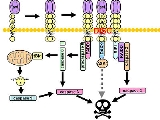
Death-inducing signaling complex
Encyclopedia

Apoptosis
Apoptosis is the process of programmed cell death that may occur in multicellular organisms. Biochemical events lead to characteristic cell changes and death. These changes include blebbing, cell shrinkage, nuclear fragmentation, chromatin condensation, and chromosomal DNA fragmentation...
-inducing cellular receptors. A typical example is FasR, which forms the DISC upon trimerization as a result of its ligand (FasL) binding. Dogma states that the DISC is composed of the death receptor, FADD
FADD
Fas-Associated protein with Death Domain is an adaptor molecule that bridges the Fas-receptor, and other death receptors, to caspase-8 through its death domain to form the death-inducing signaling complex during apoptosis. -Signalling:...
, and caspase 8
Caspase 8
Caspase 8 is a caspase protein, encoded by the CASP8 gene. It most likely acts upon caspase 3.CASP8 orthologs have been identified in numerous mammals for which complete genome data are available...
. It transduces a downstream signal cascade resulting in apoptosis.

